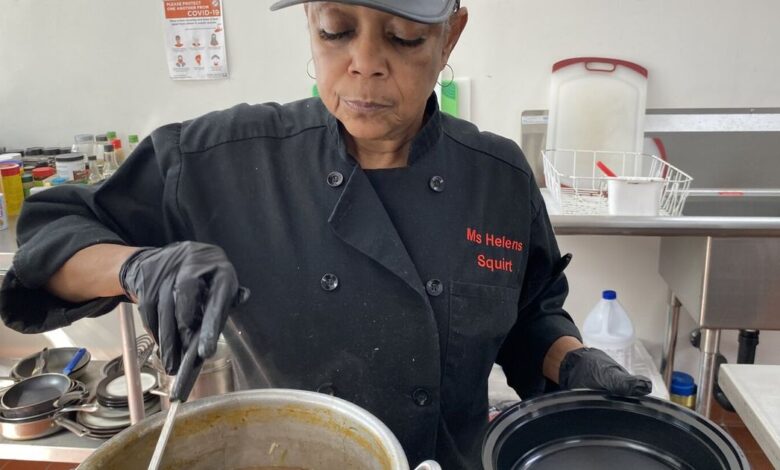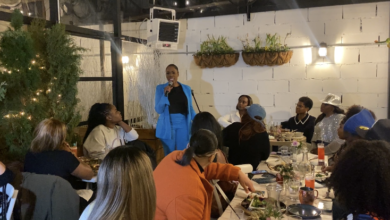Black women entrepreneurs discover obstacles, blessings in new Seattle

Jess Henton is on a mission. So is Bridgette Johnson.
Both women are Black entrepreneurs trying to stake or re-stake their claim in the Seattle restaurant scene.
Johnson is the owner of Central Cafe and Juice Bar on East Cherry Street near Martin Luther King Jr. Way. In its sixth year, her business is made up of neighborhood regulars who walk or bike there. Students stop by on their way to and from school. And then there are those who are willing to drive miles to the cozy cafe for her delicious smoothies, coffees or pastries.
Henton is a part of Seattle’s soul-food royalty. She’s the daughter of Helen Coleman, owner of Ms. Helen’s Soul Bistro. For more than 30 years, Ms. Helen made Southern transplants feel at home and introduced the Pacific Northwest palate to fried catfish, collard greens, smothered pork chops, steamed cabbage, hot water cornbread and oxtails.
Now Henton, affectionately known by many as Squirt, and Johnson are experiencing the growing pangs many small businesses go through but are often made more complicated for Black-owned and women-owned small businesses.
Black-owned businesses have experienced significant growth in recent years, up 14% from 2020, according to the U.S. Census. Of Black-owned businesses, 37% are women owned. A study by the Harvard Business Review found that Black women make up the fastest-growing group of entrepreneurs in the country. Yet the study also cited four main challenges facing Black women: access to capital, prejudice from conventional lenders, lack of support and burnout. There are private grants available to support Black women in business, but even those have come under attack lately as being discriminatory.
Henton and Johnson, who both live in the Central District, have seen the cost of commercial space there rise.
Johnson recently expanded to a second location at the Seattle Municipal Tower at 700 Fifth Ave. The city had approached her about opening a spot downtown as part of its Seattle Restored program to lure businesses and people back after the pandemic.
“Because it’s a city building I couldn’t bring in my own contractor. The bad part is they have a list of their own contractors and the project manager was coming back with high estimates three or four times” what she was expecting. She said a project that was supposed to cost $125,000 ended up over $400,000.
“They were trying to get me to pay that but I didn’t,” said Johnson, who spent 12 years as a Whole Foods prepared-food manager before breaking out on her own.
Instead, she said she wrote to the mayor’s office and a few weeks later she was notified much of the costs would be waived. The mayor’s office said the costs were covered by the Seattle Restored program because the improvements would benefit Central Cafe and any future tenants. As of December, 76% of the entrepreneurs participating in Seattle Restored are women.
If you build it, will they come?
Johnson’s new challenge is to win over downtown customers. Although Amazon has ordered its employees to return to the workplace, and the city has asked that workers go in at least two days a week, foot traffic downtown and in the municipal tower isn’t what it was pre-pandemic.
“I need more signage to let people know I’m here, since I’m inside” the building, said Johnson.
Henton hopes that won’t be the case when Ms. Helen’s Soul Bistro opens either late this year or early 2025 in Yesler Towers at 809 S. Washington St. The building is under construction and Henton will occupy 1,700 square feet on the ground floor.
The restaurant first opened in 1970 on 23rd Avenue and East Union Street when her mother moved with her new husband from Los Angeles to Seattle. Once Coleman opened what was then called Helen’s Diner, she soon built a reputation of feeding celebrities such as Muhammad Ali, Richard Pryor and pro athletes, the rich and those who sometimes couldn’t pay.
“If you were hungry she would feed you. She may talk to you crazy, which was another thing she was famous for. But at the end of the day she had a big heart and made sure people were taken care of.”
Helen’s Diner closed in the mid 1980s. It reopened as Ms. Helen’s Soul Food in 1987. That remained open until the building was damaged in the Nisqually earthquake in 2001. Henton moved back to Los Angeles and stayed until 2012 when her mother called to say she wanted to open the restaurant again. But Seattle had changed, especially the Central District.
“The community leaders saw the serious effects of gentrification in the area and all of our Black businesses had began to close or relocated to different parts of the city. So they came after Mom to see if she could reopen. They started formulating committees and having meetings.”
Tom Bangasser attended some of those meetings. Henton credits the business owner with generating interest in reviving Ms. Helen’s during that time. As a family partner in the old Midtown Center property, Bangasser pushed to preserve space in the CD for Black-owned business. A legal battle between the Bangasser family resulted in the property being sold to developers.
Like Johnson, Henton was again approached in 2021 about bringing Ms. Helen’s back, this time to a brick-and-mortar, sit-down restaurant. Lake Union Partners, which has developments across the city, showed Henton a 3,000-square-foot space in the CD. Henton said she tried to imagine Ms. Helen’s in such a huge space but eventually decided she couldn’t make the space work financially and wanted to re-create the eatery in a more intimate space, much as it was in the 1970s.
Challenges to doing business
Access to capital and support were issues for Henton.
“Everybody was talking about ‘we want you to come back. We want you to do this.’ I was like, wait a minute. So you want us to come back, but where’s the financing and funding? Where are programs we could possibly qualify for? Where’s the support team that we could use to get things done?” Henton recalled.
She eventually found a partner in the Central Area Youth Association, where she prepares meals for children after school, and also takes orders for Ms. Helen’s three days a week. (As a person with Louisiana roots, I must say the gumbo is the real deal. It was so good that I forgot I don’t like okra until I finished the last drop of gumbo.)
Henton’s mission is to get Ms. Helen’s Soul Bistro open so her mother, now 88, can realize her dream. The new 1,700 square-foot space is planned for the ground floor of Yesler Towers, currently under construction in the Yesler Terrace neighborhood. She said the developer is working with her to make her lease payments affordable. In addition, the Seattle Office of Economic Development has reached out to her to offer assistance. While she’s handling the permits and other requirements, she’s also working on her menu that will include daily specials, her family’s cornbread and the Mount St. Helens burger.
For those who remember the Ms. Helen’s of yesteryear, that’s what they can expect at the new Ms. Helen’s. No nouveau soul — rather, real soul food.
“God said to me don’t try to put new wine in an old wine skin,” said Henton, who worked as a chef at an L.A. shelter for years. “You have to be all in and live, breath and sleep this. I’m going to do what I know best.”



